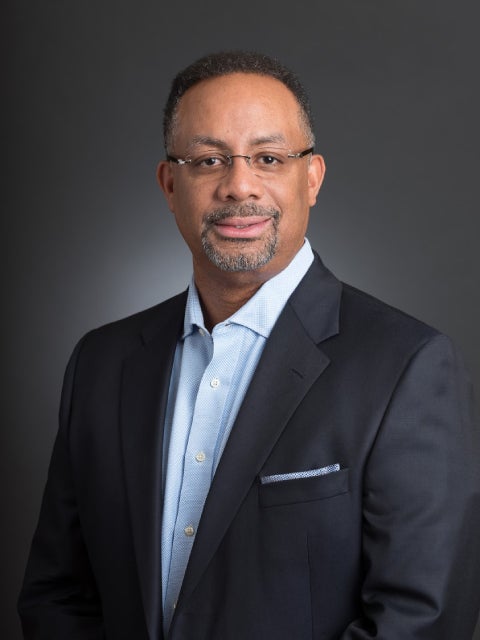
Brian Ellis
SVP and General Counsel
Danaher
Washington, DC
Leaders don’t become leaders without mentors — or their mentees. Brian Ellis has learned this firsthand on his career path to senior vice president and general counsel at Danaher. A Fortune 200 multinational science and technology company, Danaher works to solve complex challenges and improve quality of life around the world.
As general counsel, Ellis also works to improve the lives of those around him. When asked about his greatest achievements during his 30-year career, Ellis says, “It’s not so much about me, but it's about the people I've been able to help.” As the largest public company in the Washington, DC metro area, Danaher employs 70,000 people, of which Ellis leads approximately 300. He mentors and sponsors as many as he can, motivating them to take charge of their careers and achieve their goals
Learning to lead
Managing and mentoring employees wasn’t something taught in law school, Ellis notes. He attributes his leadership success to his mentors, whether it was at the US Attorney’s Office or his first in-house role at GE Health.
When Ellis became general counsel at Danaher, he relied heavily on James Dallas, an executive officer at his previous employer Medtronic. Dallas gave him the C-suite perspective on the role requirements not listed in the job description. This guidance was critical as he ascended to become the CLO, Ellis explains:
“There's no way you can walk into this job – no matter how bright you might think you are, how sustainable you are your own — there’s no chance you're ready without that level of mentorship and sponsorship.”
This was evident as he learned more about the business, especially the complexity inherent in its finances. He realized he needed help to excel in his role. So, Ellis asked a colleague for advice, humbly saying, “I don't get this piece, and if you wouldn't mind, could you give me finance for dummies?”
His humility has also helped him lead teams from a variety of areas beyond legal, such as environmental, compliance, and healthcare. To better understand how to lead employees with disparate professional backgrounds, he sought advice again from another expert — this time his wife, a seasoned HR professional.
The most valuable lesson Ellis has learned along the way is don’t get in the way of leaders who report to you. “I listened more than I spoke, and I really just tried to help lead people versus trying to do their respective jobs, which I was not qualified to do,” he says. Instead, he focused on what he did know: helping people get their jobs done.
DEI starts at the source
Diversity, Equity, and Inclusion (DEI) programs have become more pressing for businesses, which have been slow in reflecting the United States’ varied demographics. According to the 2021 ACC Law Department Benchmarking Report, 46.9 percent of respondents have a formal program to increase diversity.
But Ellis says that unfortunately the reality is that not much has changed in the past 30 years for law firms, where the number of diverse employees is “underwhelming.” It has slightly improved for women, but not meaningfully for people of color.
A 2019 National Association for Law Placement (NALP) study found that 35.4 percent of firm attorneys are women and 16.1 percent are people of color. The exact number is a less clear for corporate legal departments, according to the aforementioned ACC report, as only 29 percent track data on diversity.
The stagnation from law firms frustrates Ellis because he knows talented people waiting to be hired. In turn, this stifles diversity in corporate legal departments, as law firms are the gateway to employment in-house.
“Until you really put those tools in place to ensure that you have diverse talent pools in your selection process, you're not going to be able to move the needle. The problem is the sourcing element,” Ellis cautions.
Despite the lackluster effort from law firms, Ellis is wholeheartedly committed to increasing DEI at Danaher. It starts with his thorough hiring process. Ellis won’t review a slate of candidates if it isn’t diverse. Once the candidate is hired, he encourages leaders to stay involved with diverse talent, providing them the same level of mentorship and opportunities as their colleagues.
He also insists that vendors must have diverse leaders. This holistic approach not only improves the team’s quality of work, but it also increases the diversity pool for candidates who might later pursue a corporate legal job.
The future of work
On February 27, 2020, Ellis attended an in-person ACC CLO Roundtable in Washington, DC, on the future of legal departments and in-house trends, the last such one before the global COVID-19 pandemic hit. There, he commiserated with fellow CLOs, learned new leadership skills, and discussed current and potential risks that might affect their companies.
One such prescient discussion arose in the last few minutes of the Roundtable, as he asked other CLOs present if they had also heard the murmurings of a spreading contagion. He wondered if others’ businesses were also pausing executive travel, despite the impact being principally in China, as it was starting to affect the global supply chain. Shortly after that Roundtable, the novel coronavirus caused the COVID-19 pandemic, which has upended life all around the world, including impacting businesses like Danaher.
Adjusting to working from home was a challenge initially. That became insignificant when friends, family members, and even fellow employees died from COVID-19. Brian is proud that among the many businesses comprising the Danaher conglomerate, some of its manufacturing companies supported global vaccine manufacturing, which has saved millions of lives.
As more people become vaccinated, returning to the office is becoming a safer option. But it’s not the only option. Ellis believes it’s up to the employees to determine what’s the most effective working environment for them and their team, whether it’s meeting in person or on Zoom calls. As long as they’re delivering work, Brian says, location doesn’t matter: “I don't manage people's whereabouts — I manage people's results.”
Managing people is more than results to Ellis. It’s also about listening to his mentees. One mentor told him that his time is “the most precious gift [you] have.” Although he has a busy schedule, Ellis makes sure he meets with his associates and mentees to offer advice. He hopes this time helping people will be his legacy at Danaher.
Learn more about the ACC CLO Club, a global network for the highest-ranking legal officer.




